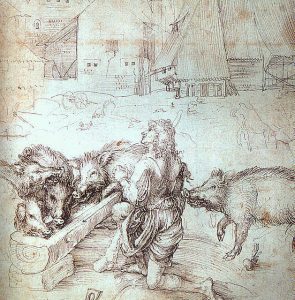Narrative Lectionary Reflection for the Third Sunday in Lent, Year Three
Lessons: Luke 15:1-32, Psalm 119:167-176 (or 119:76)
Theme: God’s faithful and generous people learn about God’s prodigal love for them–and for all people.
Key Scripture: Just so, I tell you, there will be more joy in heaven over one sinner who repents than over ninety-nine righteous persons who need no repentance. Luke 15:7
Preaching/Teaching Reflection
“Use it up. Wear it out. Make it do, or do without.” This rallying cry from the Great Depression of the 20th century is certainly applicable to this week’s gospel lesson and to the concept of stewardship in general. It’s a slogan that challenges our disposable society, one that in general puts precious little value on people, places, or possessions.
Jesus places a high value on human life and on relationships. Everyone has worth and matters, especially those most ignored and marginalized by the “in-crowd.” In this week’s reading, we find the religious elite grumbling that he “welcomes sinners and eats with them.” Gentiles and sinners and women, oh my! It’s time for a trio of parables to challenge the mindset and assumptions of the grumblers.
The first parable concerns the one pesky sheep out of the hundred that is lost and soon found by the persistent shepherd. Jesus’ obvious teaching is that no life is beyond God’s grace and love, and that the Divine Shepherd
 will seek out even the most recalcitrant wanderer. The second parable tells the story of a woman who has ten silver coins, loses one, searches diligently, finds it, and gathers her friends and neighbors to rejoice in her good fortune. Again, no one is outside of God’s grace-full reach, Jesus says.
will seek out even the most recalcitrant wanderer. The second parable tells the story of a woman who has ten silver coins, loses one, searches diligently, finds it, and gathers her friends and neighbors to rejoice in her good fortune. Again, no one is outside of God’s grace-full reach, Jesus says.
Just in case those two short parables don’t hit home for the in-crowd mumblers, Jesus tells the powerful story that’s known to most people as “The Prodigal Son.” The main character is the younger son who asks his father to give him his inheritance, the share of property that will belong to him upon his father’s death. It was an audacious request because land was a family’s most important asset and his father is still very much alive. Still, the father grants him his wish, and the younger son leaves and squanders everything in a spectacular fall from grace and societal place.
Even so, when the son comes home with his spendthrift tail between his legs, the father welcomes him with unconditional love before the young man can even get his carefully rehearsed tale out of his mouth. The fatted calf is slaughtered and a feast prepared. Of course, we know how the firstborn “good” son responds—he’s  furious. This isn’t logical. This isn’t fair. The firstborn can see only how he’s been slighted, how he hasn’t gotten his fair share. In the end, we see that the story might better be called “The Prodigal Father” for his prodigal love that knows no bounds or (thankfully!) no earthly reason.
furious. This isn’t logical. This isn’t fair. The firstborn can see only how he’s been slighted, how he hasn’t gotten his fair share. In the end, we see that the story might better be called “The Prodigal Father” for his prodigal love that knows no bounds or (thankfully!) no earthly reason.
Losing and finding and remembering are important words for modern day steward-disciples to ponder, too. What have we lost that needs to be valued and found? What do we need to remember so that we do not experience loss and a path to destruction? What are we begrudgingly holding on to with a sense of entitlement at the expense of our brothers or sisters?
Some answers seem quite simple. No one is beyond the reach of God’s love and grace. All are invited to the table and into Christ’s beloved body. No one is so lost that they cannot be found. God remembers and is faithful to divine promise–even when tested and tried. If this is such an evident truth, why do we have such a hard time remembering when it comes to our communities, our choices, and our resources?
It’s easy to say we love the poor and long to help them. We can write a check to a charity that will help provide clean water, micro-loans, and education to those in dire need. Yet do we then counteract that good will when we fail to consider the source of cheap clothing, of coffee, tea, and chocolate that is not fairly traded? What of our choice to invest in and profit from companies that exploit labor, land, and resources of the world’s most vulnerable? Are we willing to count people, land, and futures expendable to have what we want at a price point that’s the lowest possible? How then are we valuing and loving our neighbors? To what lengths are we willing to go to “find” what has been lost and redeem it at great price and community celebration?
To God, we are not expendable. We are of great worth: Worth searching for, worth finding, and worth celebrating. How can we in turn live into these stories of losing, finding, and remembering that counter a disposable culture and honor an enduring God? No, the answers are not easy and quick. They are, however, worth contending with as we seek to follow the one who has chosen and found us.
In Worship
Put special emphasis on this week’s psalm, especially verse 176: “I have gone astray like a lost sheep; seek out your servant,/for I do not forget your commandments.” You might incorporate it into the spoken confession. You might also weave it into a short reflection between the verses of “Savior, Like a Shepherd Lead Us” either as a sung confession or as an entrance hymn.
With Youth
The story of The Prodigal Son resonates strongly with many youth. Why not teach them about biblical inheritance laws where the father’s estate is divided into equal portions and the older son given a double portion. But don’t stop there! Compare biblical inheritance laws with primogeniture, where the eldest inherits everything. Discuss how or whether this is fair. Read this short article by Bruce Wells to help you prepare. Invite the youth to consider how biblical inheritance laws might inform a more holistic way to look at property division and care of all people.
If you have a long time with your youth, consider watching Ironman as a modern-day retelling of the parable of The Prodigal Son. How does Tony’s story of estrangement and redemption parallel the biblical account?
With Children
Finding the Lost Sheep
Cut out 100 paper sheep. Affix 99 of them to the altar railing or somewhere visible in worship. Hide the one remaining sheep somewhere that can easily be found. Gather the children and ask them if they’ve ever lost something that was important to them and then later found it? Listen to their stories. Share one of your stories if you have one. Invite conversation about how good it felt to finally find the thing that went missing. Did they tell others about their find and good fortune? Share with the children the parable of the Lost Sheep, pointing out the 99 sheep. Some of the children may want to count them. Jesus was trying to get the people to understand that everyone is precious and worth finding and saving. That’s good news because EVERYONE is precious in Jesus’ sight. But wait! What about that one lost sheep? Maybe it’s hidden in plain sight. Have the children look for it. Once it’s found, rejoice! Applaud! Then ask the children what precious child of God might be hidden in plain sight from us. Who is missing from our congregation? Finish with a short prayer asking God to open our eyes to find the “missing sheep” who need to be part of our community and to find ways to invite and welcome them.
Weekly Stewardship Bulletin Insert
Economics is a hotly-debated topic. Who benefits from government and business decisions? Who is hurt? Who is lost in the shuffle? Can anyone bring relief to a sluggish economy and shrinking middle class? Who is our financial hero: someone red, someone blue, someone like me, or maybe like you? What in the world are God’s people to do? The answer is found in Jesus’ economy of abundance in a world of scarcity. As stewards of God’s economy, we are called to see above and beyond the financial fracas around us, to look and listen for God’s prodigal promise of enough and then some, and to live our lives accordingly: careful but not fearful, wise but ever hopeful.
Stewardship at Home
What do you value? For what would you suspend all rational reason to search for? What are the bounds of your love? Think about how the Pharisees and scribes were grumbling about Jesus’ choice of dinner company. Jesus had this uncanny way of drawing people on the margins in, of seeing the good where others saw only sin and dirt.
This week make it a point to value people and relationships over “stuff” or social status. Who do you need to welcome back into your life and home? For whom do you need to go the extra mile? Pray for God to make clear to you a way to open your heart and home to those who need you most.
Photos: Dom Fellowes, Daniel R. Blume, and Durer’s Prodigal Son, Creative Commons. Thanks!
Note: Reprint rights granted to congregations and other church organizations for local, nonprofit use. Just include this note: “Copyright (c) 2017, Rev. Sharron Blezard. Used by Permission.” Other uses, please inquire: thewritelife@hotmail.com.




Leave a Reply